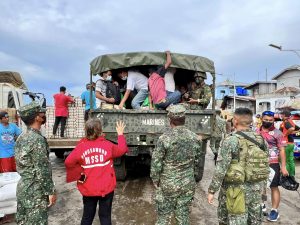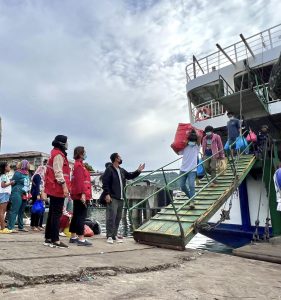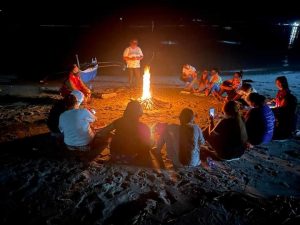“The multiple scars on that small child’s hands caught my attention. When I asked him about it, he just shrugged his shoulders and told me that it’s part of his work. It was heartbreaking,” said Michelle Agata as she recounted her interaction with a child victim-survivor of human trafficking in Sulu.
In her role as the Bangsamoro region’s focal person for the Recovery and Reintegration Program for Trafficked Persons (RRPTP), Agata vividly remembers cases involving like that of the child they rescued in 2023.
According to the Ministry of Social Services and Development (MSSD), most human trafficking cases in the region involve illegal recruitment, syndicated mendicancy, debt bondage, organ trafficking, and forced labor.
MSSD’s statistical report states that a total of 1,377 trafficked individuals inside and outside the region have been rescued since 2019. Year 2023 marked the highest number of rescued victim-survivors, totaling 634, compared to the 502 cases in 2022, 100 cases in 2021, 40 cases in 2020 (during the COVID-19 peak), and 101 cases in 2019.
The increase in the number of rescued survivors of human trafficking can be attributed to the strengthened referral pathway and advocacy campaigns of the Bangsamoro Government, leading to enhanced reporting mechanisms and faster rescue operations across the region.


MSSD’s field workers welcome returning individuals from Sabah at Bongao Port, Tawi-Tawi for provision of emergency assistance and profiling procedures. Most of these individuals were illegally recruited to work in Sabah with a promise of a hefty salary but ended up working hazardous jobs with little to no compensation. (Photo from MSSD)
In 2021, the region implemented Executive Order No. 0015, s. 2021, expanding the Bangsamoro Task Force Against Trafficking (BTFAT) to the Bangsamoro Inter-Agency Committee on Anti-Trafficking and Violence Against Women and their Children (BIACAT-VAWC).
This expansion aimed to address the plight of female survivors and children aged 0-17 who experienced abuse, violence, forced labor, and debt bondage at the hands of illegal recruiters. The BIACAT-VAWC is now at the forefront of the region’s efforts to combat human trafficking and violence against women and children.
BIACAT-VAWC, chaired by the Office of the Senior Minister and co-chaired by the MSSD, is the region’s counterpart of the national government’s Inter-Agency Council Against Trafficking (IACAT).
Agata emphasized, “This task force is responsible for the implementation of the four pillars of intervention for victim-survivors of Trafficking in Persons (TiP) — protection, prevention, prosecution, and partnership in accordance with Republic Act No. 10364, the Expanded Anti-Trafficking in Persons Act of 2012, and Republic Act No. 9262, the Anti-Violence Against Women and Their Children Act of 2004.”
“The coastal areas of the region, particularly in the provinces of Sulu and Tawi-Tawi, are being utilized by traffickers as transit points or ‘back doors’. The promise of higher wages and a better life lure the victims. Most of them were promised a work abroad but end up as fisherfolk, domestic workers, or worse, even as prostitutes with little to no compensation. The BIACAT-VAWC was formed aiming to end both human trafficking and violence against women and children (VAWC) in BARMM,” she added.
With the strengthened coordination of the members of this task force and the established referral pathway, the Bangsamoro Government is now able to immediately rescue and reintegrate victims to their places of origin, both inside and outside the region.
Fatima Salik, a victim-survivor of human trafficking, shared her experiences during a radio episode of MSSD aired last July 29, 2023.
“I was 17 years old when I was offered a job in Syria by a recruiter. Since I was underage at that time, the agency processed all my documents for me. They successfully changed my name and age, paid for everything, and all I had to do was wait,” she recounted.
The agency successfully falsified her documents, and she, along with four more individuals, were able to fly to Syria.
“When we arrived at the airport in Damascus, we were surprised because the ones who picked us up were police. We were scared, so we followed them. Instead of taking us to our employer’s house, they locked us up in Damascus for two days. We had no food and sleep in detention. After that, they took us to Aleppo, where we were locked up for four days. The police didn’t tell us why we were being detained,” she shared.
After being released from prison, the five of them stayed at their agency’s office for three months with neither salary nor allowance. Their documents were “reprocessed,” and they were eventually deployed to their employers. However, the promised monthly salary was far from the actual compensation they received.
“They promised us a monthly salary of P18,000, but my employer only paid me P4,200. I couldn’t send money to my family because the agency deducted their commission from my salary,” Fatima explained.
She stayed with her employer for more than a year until she decided to flee and return to the Philippines.
Fatima became one of the beneficiaries of MSSD-BARMM’s RRPTP. To facilitate her recovery, she underwent Mental Health and Psychosocial Support (MHPSS) and was referred to the Ople Center, a non-government organization actively advocating for migrant workers’ rights and welfare. She now uses the sewing machine she received from the Ople Center to sustain her livelihood.
The Bangsamoro Government helps the rescued survivors of human trafficking through an array of interventions such as provision of food and non-food items, temporary shelter, medical support, referral to development partners, and legal remedy.

Human trafficking survivors and distressed Bangsamoro overseas workers undergo Mental Health and Psychosocial Support (MHPSS) sessions at Amaya Beach Resort, Barangay Kusiong, Datu Odin Sinsuat, Maguindanao del Norte on March 23-24, 2022, through the Recovery and Reintegration Program for Trafficked Persons (RRPTP) of Ministry of Social Services and Development. (File Photo from MSSD)
In Fatima’s words, “OFWs are lucky today because BARMM and other agencies are here to support them.” She is now an advocate against human trafficking, particularly in the Bangsamoro region, using her experience to raise awareness.
Fatima offers this advice to those considering working abroad: “First, plan meticulously. Second, ensure the agency you’re heading to is registered. Third, make sure you go through the Overseas Workers Welfare Administration (OWWA), Technical Education and Skills Development Authority (TESDA), and Philippine Overseas Employment Administration (POEA). Don’t easily trust recruiters who approach you.”
For the past eight consecutive years, the Philippines has retained its Tier 1 Ranking in the fight against human trafficking. The 2023 Trafficking in Persons Report (TIP), officially released on June 15, 2023, by US Secretary of State Anthony Blinken, recognizes the Philippines among the 30 countries that fully meet the minimum standards for eradicating trafficking in persons, in accordance with the US Trafficking Victims Protection Act of 2000.
This designation signifies that the country remains unwavering in its commitment to eliminating severe forms of human trafficking. Yet, there is more work to be done. It is essential to recognize that anyone can potentially become a victim of human trafficking. The culture of silence surrounding this issue must be shattered, and it is the responsibility of all to stand up for those affected.
Human trafficking is a direct violation of human rights. While more victims are rescued year, these efforts alone are insufficient to eradicate the problem. Advocacy campaigns against human trafficking must be continuously amplified and reinforced, especially in provinces like Sulu and Tawi-Tawi as a preventive measure to this issue.
With the help of its constituents and development partners across the country, Bangsamoro Government’s commitment to moral governance transcends administrative borders. It continues to inspire more efforts to rescue, reintegrate, and support survivors on the path to recovery and justice, with the ultimate goal of ending human trafficking and VAWC in the region. (Norjana Malawi/BIO)







